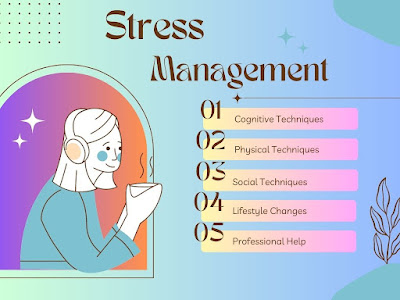The Ultimate Guide to Stress Management
Introduction
Stress - a six-letter word that can make you feel like you’re carrying the weight of the world on your shoulders. It’s the feeling of being overwhelmed, anxious, or frustrated. Stress can not only affect our mental well-being but also have detrimental effects on our physical health. Headaches, muscle tension, and sleep problems can all be caused by stress. This is why stress management techniques are essential for our overall well-being.
Stress management can help improve your quality of life tremendously. It can help you handle difficult situations calmly, increase your productivity, and even improve your relationships. By identifying and practicing the techniques that work best for you, you can decrease your stress levels significantly.
So, let’s dive into the world of stress management techniques and explore the various ways that can help you take control of your stress levels.
Statistical facts
1. Stress is the leading cause of disability worldwide, accounting for nearly one-third of all years lived with disability. (Source: World Health Organization)
2. One in four adults report feeling stressed at some point during the day, and one in five adults experience extreme stress that results in physical symptoms such as headache or fatigue. (Source: American Psychological Association)
3. Chronic stress is associated with an increased risk of heart disease, stroke, and other serious health problems. (Source: Harvard Health Publishing)
4. Workplace stress costs the US economy an estimated $300 billion annually due to increased healthcare costs and lost productivity. (Source: American Institute of Stress)
5. Mindfulness-based stress reduction techniques have been shown to reduce stress levels and improve emotional well-being in a variety of populations, including students, healthcare workers, and military personnel. (Source: Journal of Evidence-Based Complementary & Alternative Medicine)
Cognitive Techniques
Cognitive Techniques can be defined as mindful approaches that can help individuals better understand their thoughts and emotions, and eventually change them for the better. With cognitive techniques, individuals can gain control over their minds and strengthen their mental faculties.
These techniques usually involve the identification of negative thought patterns and replacing them with positive ones. Cognitive techniques can be used to treat a range of mental health issues, including anxiety and depression.
By learning to identify and change negative thought patterns, individuals can improve their overall quality of life and achieve a greater sense of well-being.
Physical Techniques
When most people think of stress reduction, physical activity is often the first thing that comes to mind. And with good reason! Exercise is one of the best ways to alleviate stress, and it has a ton of other health benefits, too.
There are a few different avenues you can take with physical techniques for stress management. Let's explore some of the most effective options.
First up, exercise and physical activity. This one might seem obvious, but it can't be overstated how much of an impact exercise can have on your mental and physical health. When you exercise, your body releases endorphins, which are natural mood boosters. Even just a few minutes of activity each day can make a big difference.
If traditional workouts don't do it for you, you might consider something like yoga or stretching. These practices are great for both the mind and body, and they're a gentle way to get moving if you're not used to more intense exercise. Plus, many yoga classes incorporate breathing techniques, which bring us to our next point.
Breathing techniques are another effective physical means of managing stress. Controlled breathing has been shown to slow heart rate and lower blood pressure, both of which can help reduce stress levels. There are plenty of resources online with instructions on different breathing techniques to try.
Finally, if you're experiencing tension or tightness in your muscles due to stress, progressive muscle relaxation might help. This technique involves tensing and relaxing different muscle groups in your body, one at a time. It can be a great way to release built-up tension and unwind.
Remember, finding physical techniques that work for you is important. You don't have to love running or yoga to reap the rewards of physical activity - there are plenty of options out there to explore.
Social Techniques
Maintain healthy relationships, join a support group, get involved in your community, and spend time with animals. Ah, finally something that doesn't involve breaking a sweat! When it comes to stress management, focusing on the social aspects of our lives can be just as important as the physical and cognitive techniques we use.
Maintaining healthy relationships is key. Having people in our lives who support us, make us laugh, and call us out on our BS can make all the difference. Even if it's just one person, having that one stable rock in the ever-changing tide of life can help alleviate stress.
Another great option is joining a support group. No, we're not talking about those self-help groups where you talk about your feelings in a circle. We're talking about interest-based groups where you can connect with like-minded individuals and share in activities and hobbies. Whether it's a book club, a knitting group, or a fantasy football league, having a regular social activity can be a great stress reliever.
Getting involved in your community can also be an excellent way to decompress. Look for volunteer opportunities in your area that align with your interests or passions. Not only will you be doing good for others, but you'll also be distracting yourself from your own stressors while making new connections and gaining new skills. Win-win-win!
And finally, spending time with animals can be both calming and therapeutic. Whether you're a dog or cat person, spending some quality time with a furry friend can lower anxiety levels and boost your mood. If you don't have your own pet, consider volunteering at an animal shelter or pet-sitting for a friend.
Remember, humans are social creatures. Don't underestimate the power of connecting with others, whether it's through maintaining relationships, joining a group, volunteering, or spending time with animals. Find what works for you and make it a part of your stress management routine.
Lifestyle Changes
Now that we've covered cognitive, social, and physical techniques, let's talk about lifestyle changes you can make to manage stress. These changes are not just good for stress relief but for your overall health and well-being.
First up, sleep. It's a no-brainer that getting enough sleep is crucial for managing stress. Lack of sleep only exacerbates stress and anxiety, making it harder to cope with daily challenges. Aim for 7-9 hours of sleep per night and try to maintain a consistent sleep schedule.
Next, let's talk about diet. Eating a healthy diet not only fuels your body with the nutrients it needs, but it can also have a major impact on your mood. Avoid processed and sugary foods, and focus on incorporating whole foods like fruits, vegetables, and lean protein. Don't forget to drink plenty of water throughout the day.
When it comes to stress management, limiting alcohol and caffeine intake is also important. While a glass of wine or a cup of coffee may help you relax at the moment, overconsumption can lead to increased anxiety and irritability.
In today's digital age, it's hard not to be constantly multitasking and glued to our screens. However, reducing multitasking and screen time can drastically reduce stress levels. Try staying focused on one task at a time and limit time spent on social media and other distracting apps.
Lastly, effectively managing your time can make a big difference in stress levels. Prioritize tasks and make to-do lists to avoid feeling overwhelmed. Set realistic goals and deadlines for yourself and don't forget to take breaks when needed.
By adopting these lifestyle changes, you'll not only manage stress more effectively but also improve your overall health and well-being.
Professional Help
Let's face it - stress can be overwhelming. Sometimes, you feel like you're drowning in it. And sometimes, you feel like there's no way out. That's when it's time to consider seeking professional help.
Therapy and counseling are two effective ways to manage stress. It's important to find a mental health professional who you feel comfortable with. Sometimes, it takes a few tries to find the right one - don't be discouraged! With a skilled therapist, you can learn coping skills and new ways of thinking to manage stress more effectively.
Medication is another option for managing stress. There are a variety of medications available that can help reduce anxiety and depression symptoms. It's important to work with a doctor to find the right medication and dosage for you.
Alternative therapies, such as acupuncture and meditation, can also be effective in managing stress. While they may not work for everyone, they are certainly worth considering. And even if they don't eliminate all of your stress, they can help you feel more relaxed and centered.
So, when is it time to seek professional help? If your stress is interfering with your relationships, work, or daily life, it's time to consider talking to a professional. Don't wait until you're drowning - seeking help early on can prevent things from getting worse.
Remember, stress management is not a one-size-fits-all solution. It takes trial and error to find what works best for you. But with a combination of cognitive, physical, and social techniques, lifestyle changes, and professional help, you can take control of your stress and live a happier, healthier life.
Conclusion
You've made it to the end, congratulations! We covered a lot of ground on stress management techniques, but let's quickly recap the key points.
First of all, we talked about the different cognitive techniques such as challenging negative self-talk, cultivating a positive mindset, and practicing gratitude. Then we delved into physical techniques like exercise, yoga, breathing techniques, and progressive muscle relaxation. We also touched on social techniques such as maintaining healthy relationships, joining a support group, getting involved in your community, and spending time with animals. Changing your lifestyle by getting enough sleep, eating a healthy diet, limiting alcohol and caffeine, reducing multitasking and screen time, and managing your time effectively was another important factor we discussed.
Finally, professional help should not be overlooked, and we addressed therapy and counseling, medication, alternative therapies, and when to seek professional help.
Now that we've reviewed the stress management techniques, it's time to personalize them to fit you best. Remember, everyone experiences stress differently, so what works for one person might not work for you. Take the tips that resonated with you the most and create a personalized stress management plan. Be specific and realistic about how you can incorporate these techniques into your daily routine.
Don't forget that stress management is an ongoing process, and even if you implement all of these techniques, you may still experience stress. Just remember to be kind to yourself and take care of your well-being as best as you can. Thanks for reading, and good luck on your stress management journey!



No comments:
Post a Comment